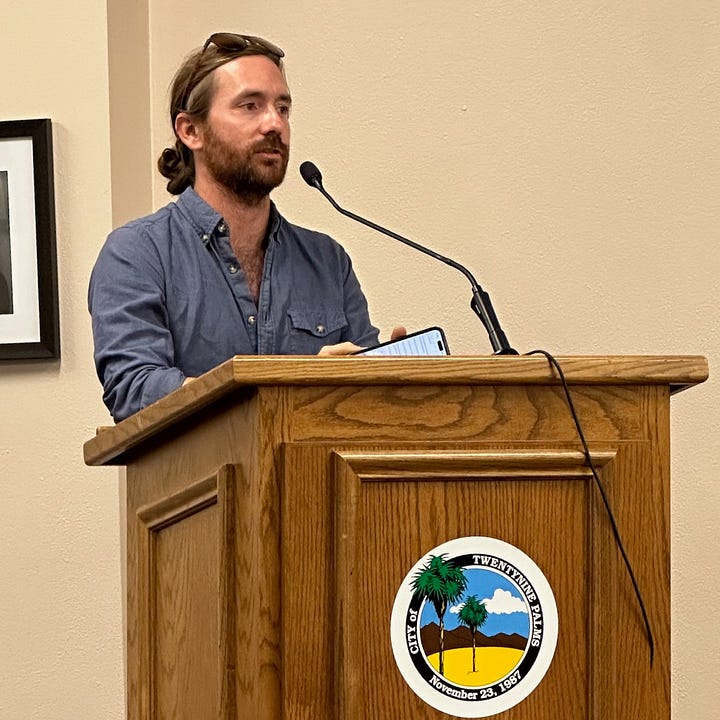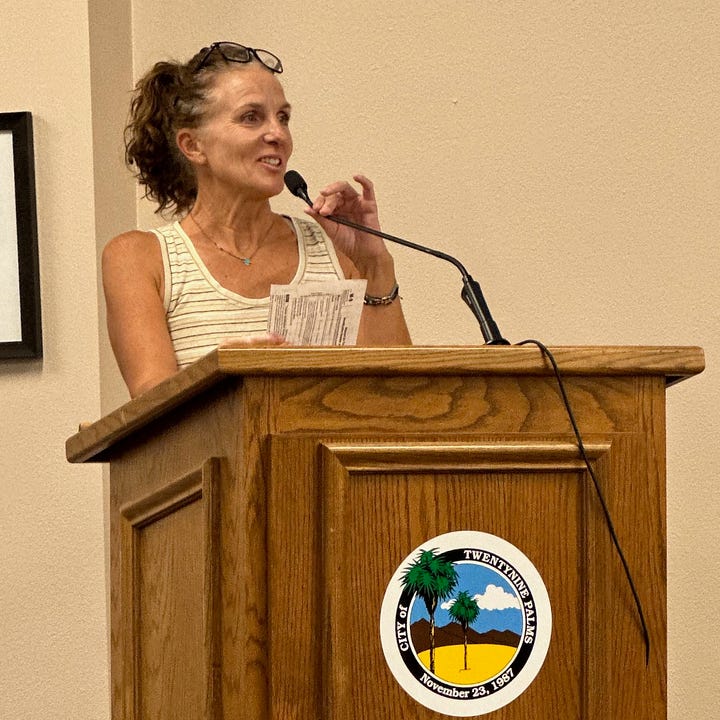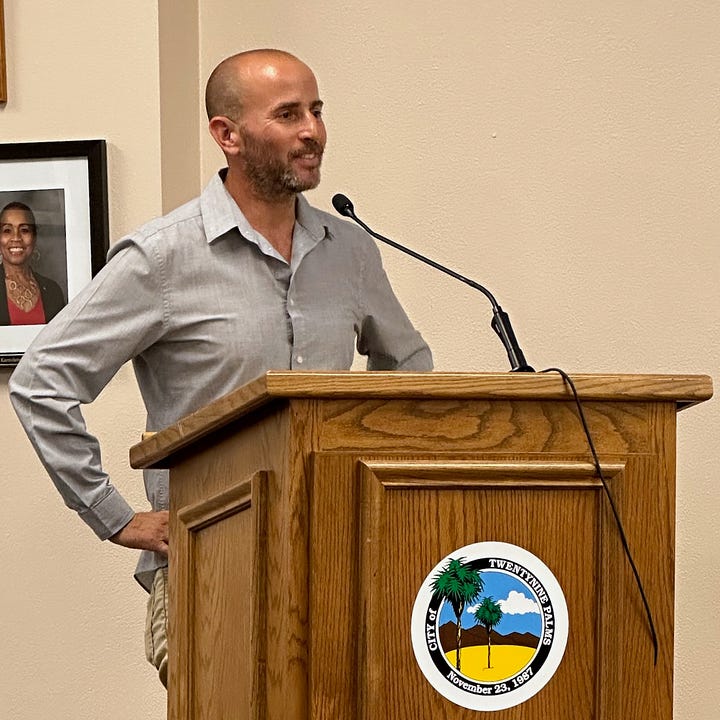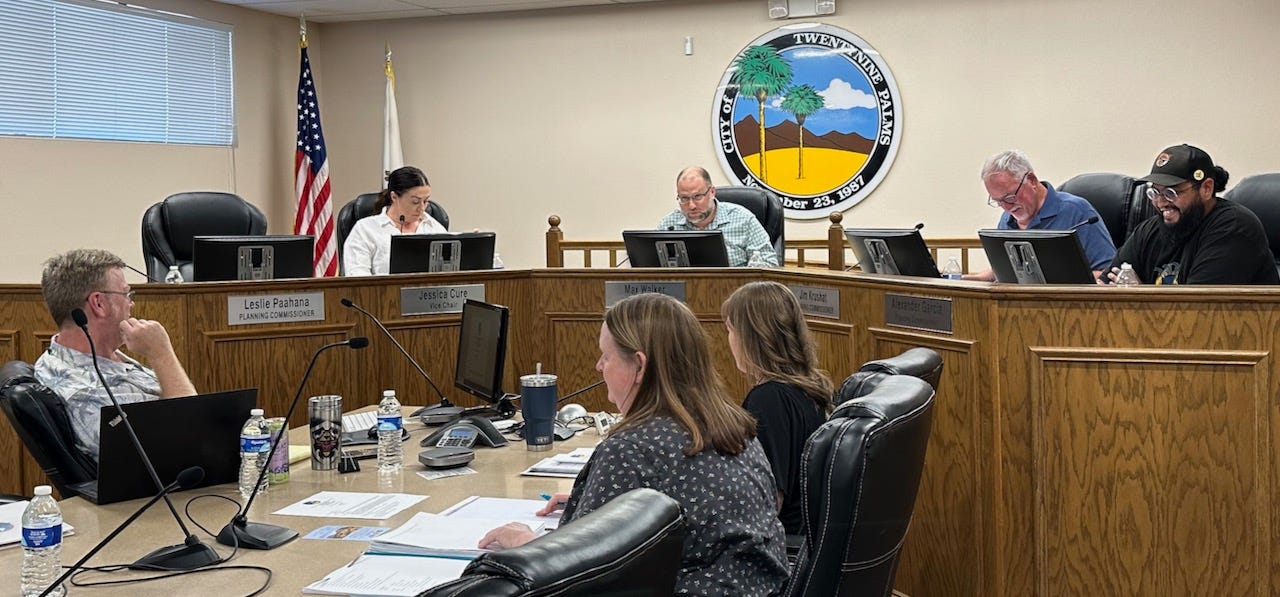RECAP: Twentynine Palms Planning Commission, August 20, 2024
Commercial campgrounds and commercial tourist zoning dominate the conversation
The Twentynine Palms Planning Commission met for just under an hour on Tuesday, August 20, for a study session on development code amendments for mobile home and recreational vehicle parks and commercial campgrounds. This was the continuation of a conversation started in September 2023—our rundown of that history is in our agenda preview for this meeting.
All Commissioners were present except Leslie Paahana, who was out with an excused absence. Interestingly, four of the five City Council candidates were also present with Mayor Steven Bilderain in the hallway, Carrie Williams and April Ramirez seated with the public, and Commissioner Jim Krushat on the dais.
General Public Comment
General public comment took place immediately after roll call. Two letters were accepted into public comment and summarized by Chair Max Walker: a proposal for an aviation hotel and a site plan for a housing and short-term rental development titled “Azure Homes,” to be located in Commercial Tourist zoning. The developer of the aviation hotel, Dror Waissengrin, addressed the Commissioners under the agenda item below. Gene Eidelman, representing the Azure Homes project, thanked the staff for their assistance and filed the letter. Neither project has submitted development plans.


As he has at several recent city meetings, Veno Nathraj addressed damage to his hotel and questioned how closely the Planning Commission was examining development projects:
You are the planning commission. You all normally give the blessings before the City Council says yes on it. You're supposed to be, for the lack of a better word, security guard, to make sure that the projects meet zoning, meets everything before passed. I don't know whether you're just rubber stamping things or what.
Study Session: Mobile Home Parks, Recreational Vehicle Parks, Commercial Campgrounds
Community Development Director Keith Gardner reviewed the current proposals for the three types of sites, while providing clarification that language would be added making it clear that “Camping and RV camping are prohibited outside of established permitted facilities.”
Mobile Home Parks
1. Defining the density of a MHP to 8 spaces per acre.
2. Increasing the minimum lot size to 10 acres.
3. Defining the minimum dimension of each space at 10' x 100' (4,000 square feet). 1
4. Reducing the parking requirement to one stall per unit and guest parking to
one stall per five units.
5. Requiring common laundry facilities.
6. Reducing the landscape buffer to ten (10) feet along street frontages.
Recreational Vehicle Parks
1. Limiting RV parks to Commercial Tourist and Public zones. RV parks are not permitted in the Rural Living zones
2. Increasing the minimum lot size to ten (10) acres.
3. Decreasing the density to five (5) spaces per acre.
4. Implementing a fifty-foot setback from all property lines.
5. Requiring trash enclosures.
6. Requiring a sewage disposal system
Commercial Campgrounds
1. Limiting campgrounds to Commercial Tourist (CT) and Public (P) zones. Campgrounds would not be permitted in the Rural Living zones
2. Increasing the minimum lot size to ten (10) acres.
3. Decreasing the density to five (5) spaces per acre
4. Implementing a fifty-foot setback from all property lines.
5. Requiring trash enclosures.
Commissioners questioned the need for regulating campgrounds when no proposals are on the table. Commissioner Krushat:
I find it interesting that we’ve had no applications, because over the last few years, I've had many people come up to me and asked me about — knowing that I'm on the Planning Commission — about commercial campgrounds or putting a campground in. I'm always stating, “Well, put your plan together. Come to the city, we'll do it.” It's interesting that nothing has come to fruition on that. So my question is, are we getting ahead of the game by putting the regulation in place?
Gardner interjects, “Yes.”
Krushat continues:
Yeah, and I'm all for that. Or do we wait until it actually somebody actually comes forward with a…I'm not sure which is the best way to go. I prefer to get ahead of the situation.
Commissioner Alex Garcia agreed that “We’re trying to get ahead of it.”
No one brought up that the campground discussion was initiated by an August 2023 letter to the Commission from Hipcamp requesting regulation revisions that would allow them to operate in Twentynine Palms. In fact, at one point, in response to Xárene Eskander asking about the Commission having used Hipcamp “as a subject expert,” Commission Chair Max Walker insisted, “We haven't had any real interaction with them.” This despite Hipcamp having been referred to as a “subject matter expert” at an earlier meeting on the topic and letters from Hipcamp having been referred to and read into the record by then Chair Krushat.
In public comment Richard Card spoke to his own “very low-impact private land camping experiences” and asked the Commission to allow camping in Rural Living zoning — this being the type of camping promoted by entities like Hipcamp.
Due to this apparent confusion, we requested further clarification from Gardner after the meeting. Gardner confirmed that Hipcamp-style renting of vacant parcels for camping would remain illegal in city limits and that the proposed language for commercial campgrounds did not permit it.




Other comments on proposed changes included Susan Peplow asking that the time limit for renting in an RV Park be increased to 28 days, expressing the need for on-site managers and endorsing their location in Commercial Tourist zoning. Veno Nathraj expressed concerns about proximity to neighborhoods and human trafficking.
Dror Waissengrin of Beverly Hills and representing Woodland Hills-based Imperial Enterprises, pressed the Commission on the need to consider opening up residential zoning to make their aviation hotel complex possible:
What lands are available for such initiatives? How can, where can we do these things? And of course, this area is very, so I don't have to tell you, how special it is, and what is it special for. But the current commercial lands that we have now, we don't think that they reflect the added value of this area, especially for this kind of initiative that we're talking about, and especially for campgrounds.…So we think that the main issue we would like to relate in this initiative (which is good, the campground authorization) is the ability for residential lands, of course, with the required permission. But this will make an initiative like ours possible. Otherwise it will take too much time, and it will be very, very complicated.
Commissioners then took on the study session topic with Krushat agreeing with Peplow regarding the need for a site manager, while Walker was concerned about the added cost for smaller facilities. Assistant Planner Diane Olson noted that they could add language requiring a site manager for larger facilities.
Also discussed was concern over the proximity of some areas zoned Commercial Tourist to existing neighborhoods particularly in the area of Larrea Ave., whether dog runs should be required, details of screening requirements, and clarification that RV parks and commercial campgrounds are subject to transient occupancy taxes (TOT).
Commissioner Alex Garcia summed up concerns over proximity and zoning:
I think keeping the campgrounds away from residential areas is, I mean, we already have a problem with noise ordinance, with short-term rentals and Airbnbs and whatnot, I mean, but that's up to the public. I don't I feel if we were to bring campgrounds closer to residential areas — I get some people spoke up about having them — but the amount of problems I feel like people already having with short-term rentals and around town already is an issue….
Krushat interjected, “I think that 10 acre requirement kind of solved that,” referring to the minimum lot size proposed for the three types of sites. Garcia continued:
It does…But then we come to a point of, like, people trying to change zoning for different things. And I think we start hitting a slippery slope once we start zoning different things and allowing bigger companies to start zoning those spaces, then it comes down to, does you know, would it be we start setting precedent of who gets to zone what, and we just have to stand firm with those kind of things, at least, I think so.
In response to a question from Commissioner Cure regarding the process for conditional use permits (CUPs) and overriding zoning, Gardner quickly outlined the development process. We emailed Gardner because this is a common question, and he outlined the process in greater detail. We are closing out our recap with his outline, which we will add to our 29 Palms Resources page.
A applicant MAY file for a free pre-application review. This is to provide the applicant with City Requirements, any technical studies required, etc.
There are three levels of use permit applications:
Site Plan Review. This is usually for smaller projects, additions / expansions of existing uses, or a change of use in an existing building (such as a former clothing store changing to a coffee shop). Those are reviewed by various City departments (engineering, public works, County Fire, etc), and decided administratively, i.e., there is no public hearing.
Administrative Use Permit. These are also reviewed by the various City Departments. Once the materials are deemed acceptable / complete, then it is advertised in the paper and to the neighbors. Unless someone asks for it to go to the Planning Commission, it is decided by the Community Development Director.
Conditional Use Permit. These are also reviewed by the various City Departments. Once the materials are deemed acceptable / complete, then it is advertised in the paper and to the neighbors. These go to the Planning Commission for a decision.
NOTE: Any decision by the Community Development Director or the Planning Commission may be appealed to a higher body. CDD gets appealed to the
PC; PC gets appealed to the Council.
If a General Plan Amendment and/or a Rezoning (Change of Zone) is proposed along with a use permit, then there is a public hearing before the Planning Commission. In this case, the PC is only advisory. Another public hearing is scheduled before the Council, who has the ultimate decision.
Any CEQA document (mitigated negative declaration or EIR), goes along with the process of the rest of the project. The CEQA document does not dictate the decision process. The CEQA process is completely separate from the public hearing process.
Leave your thoughts in the comments below. Please note that we do not allow anonymous comments. Please be sure your first and last name is on your profile prior to commenting. Anonymous comments will be deleted.
Feel free to share this article!
Many communities in the Morongo Basin are economically disadvantaged, so our coverage will always be free. However, if you have the means to support our work, we always appreciate upgrades to a paid subscription. Your upgrade helps keep subscriptions free for those who cannot afford to donate.
Note that donations in excess of $100 are tax deductible to the extent allowed by law, and your subscription/donation will be listed as AHA Projects, the name of our fiscal receiver, on your statement. Donations over $100 can be made via the Aha Paypal.
This is what’s in the staff report in the agenda, but clearly 10’ x 100’ is 1000 square feet.


